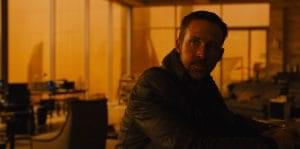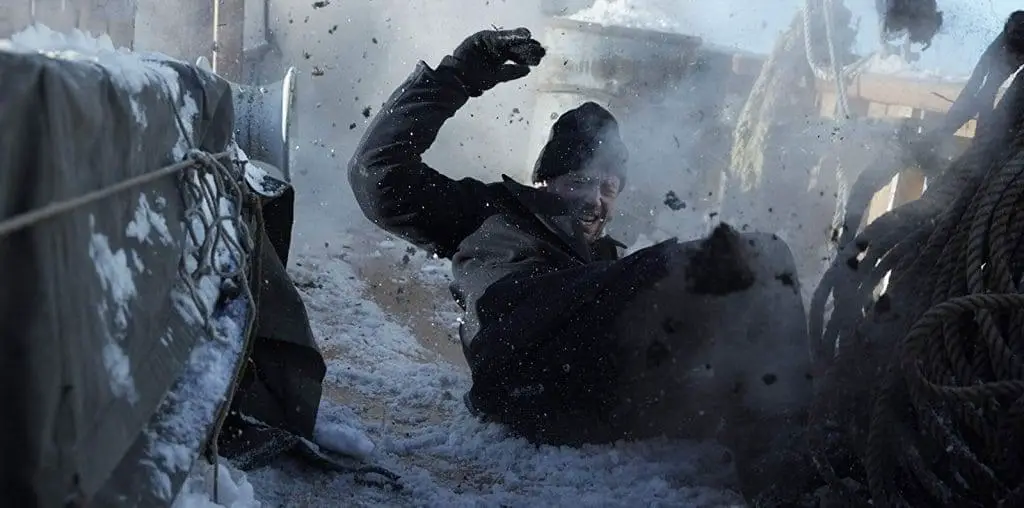
Denis Villeneuve’s Blade Runner 2049 is everything you want it to be and nothing you don’t. It encapsulates and resonates with what went before while taking the narrative in a new direction. It organically emerges from Blade Runner.
In 1982 we were just embarking on a golden age of film Science Fiction though we did not know it. Five years before, Star Wars had permanently burned into our retinas the image of a clean future… wide spaces filled with shiny white composite-armored Storm Troopers whose blasters fired bloodless bolts of pure energy. Only the guy in black put his hands on anyone. It was delirious space opera, fun, and revolutionary, life-altering, and it set us on the road to a generation of real Science Fiction movies. They weren’t all good. Then, as now, we had to dig through a lot of bubblegum schlock to get to the denser, more cerebral work. Meaning no slight to B movies or fans, I am one as well, but occasionally a masterpiece is created.

“Denis Villeneuve’s Blade Runner 2049 is everything you want it to be and nothing you don’t.”
Suddenly out of nowhere came Blade Runner: a dystopian L.A. Noir film set in a grimy, bloody and impersonal hyper-technical future. It was based on a novel by a suicidal hallucinating genius madman. It’s a quiet film, not much dialog, rich in the ambience of the world drawn from whole cloth that could plausibly be our own L.A. almost 40 years on. The pre-digital practical effects by Douglas Trumbull were (and largely still are) unmatched by anything else seen on film.
It was an odd film for the time that seemed unlikely to succeed and indeed it took some time for it to catch on, but once the notion that real literature had made a rare appearance on film, painted in light by the masterful Ridley Scott, Blade Runner reset our concept of the future, at least down one path, and forever sealed that image in time.
Blade Runner (for anyone oblivious to pop culture for the last 35 years) is set in 2019 and concerns artificial humans called replicants created by the Tyrell corporation who are genetically nearly identical to humans, but stronger, smarter, and more robust.
Replicants, despite having self-awareness and human emotion, were seen as machines, consigned to slavery in the off-world colonies. They lived and died brief lives as soldiers, sex-dolls, and servants. Eventually, it turns out they weren’t entirely sanguine about this fate and there were violent rebellions by the Nexus 6 models off-world that led to laws banning them on Earth. Rick Deckard was an assassin (a “Blade Runner”) sent to “retire” them. His crisis of conscience comes when he falls in love with an experimental replicant, Rachel, who initially doesn’t know she’s not human.
By 2049 much water has gone under the bridge. New replicants are back on Earth. Created by Niander Wallace (Jared Leto), who took over after the failures of the Tyrell corp, they are a docile obedient service class.
Three excellent short films have been made to fill in the history of the 30-year period since the events of Blade Runner:
All electronic records (which means all records) were lost in the 2022 black out, so the current Blade Runner mission to find and “retire” older Nexus models is complex and laborious. So much so that the LAPD relies on replicants to do the detective work. LAPD officer KD9-3.7 (Ryan Gosling) is hunting a rogue replicant when he discovers a hidden box being guarded by the Nexus 8 named Sapper Morton (Dave Bautista) on a protein farm outside the city. Inside the box is a discovery that could upend the relationship between humans and replicants. Digging into the mystery, “K” turns up a lead on Deckard (Harrison Ford), who has been in hiding for 30 years and who knows how that box came to be where it is. K finding Deckard leads each of them to revelations about themselves, the world, and their place in it.

“Central to the story are questions of love, identity, and memory. What, if anything, does it mean to be human?”
The life K leads seems sad, same as Deckard’s life in the city before him. Humans loathe replicants and he must endure epithets like “skinner”/”skin job” without reacting. He comes home to a tiny shoebox apartment and interacts only with his holographic AI girlfriend, Joi (Ana De Armas). Joi is a product of course of the Wallace company, same as K. She seems to be the cheapest, out-of-the-box model, ads for her are everywhere in the city. Rounding out the supporting cast are Robin Wright as the hardboiled LAPD Lieutenant Joshi and Sylvia Hoeks as Luv, Wallace’s faithful replicant assistant and muscle.
The acting across the board is stellar, as expected from the talented cast. Chemistry between Gosling and Ford sparks, and Leto, Hoeks, and every other actor turn in inspired performances. Jared Leto is as good as he thinks he is, truly a wonderful actor who pours himself into his roles. Gosling shines as K. He manages to sell the idea that a professional killer can be childlike in his take on the world. As pathetic as the love he has for Joi may seem to us, it is real to K and it comes through poignantly.

“The acting across the board is stellar, as expected from the talented cast.”
Music and sound are critical to the film. Hans Zimmer and Benjamin Wallfisch have succeeded as Roger Deakins did with the cinematography in evoking the atmosphere of the original without being a slave to it. The sequel is even more beautifully painted in light and sound, textured and complicated and wonderful. The visual detail of the world demands full immersion and multiple viewings. There’s far more to discover than can even be hinted at in a review.
For deep geek fans of the first film there are echoes everywhere from small visual cues to audio effects and musical callbacks. However, it also stands on its own and could be enjoyed without having seen the original (watch the original).
Central to the story are questions of love, identity, and memory. What, if anything, does it mean to be human? Can a human fall in love with an artificial personality? Can two artificial personalities fall in love? How much of our identity is formed by our memories? Are we as thinking beings nothing more than the story told by what we recall? Where in all this, would a “soul” reside?
Blade Runner 2049 is a marvel of state of the art filmmaking in service to a literary narrative and characters well worthy of your time. This is a magnificent accomplishment in film.
Blade Runner 2049 (2017). Directed by Denis Villeneuve. Written by Hampton Fancher, Michael Green. Starring Ryan Gosling, Harrison Ford, Ana De Armas, Jared Leto, Robin Wright.
9 out of 10


[…] Blade Runner 2049 has the best cinematography and performance by Ryan Gosling and Harrison Ford. It tells a story of […]
Excellent can’t wait to see it